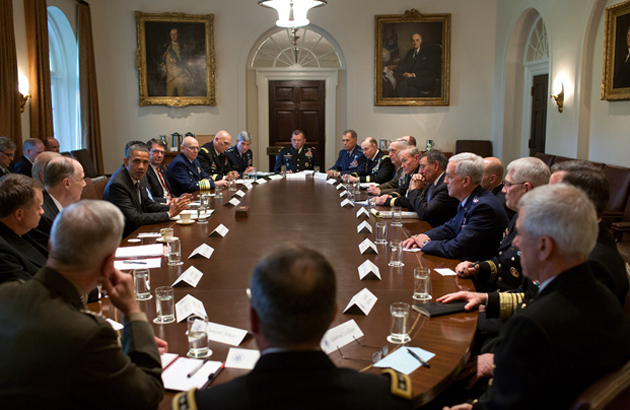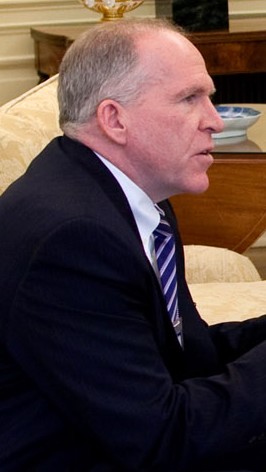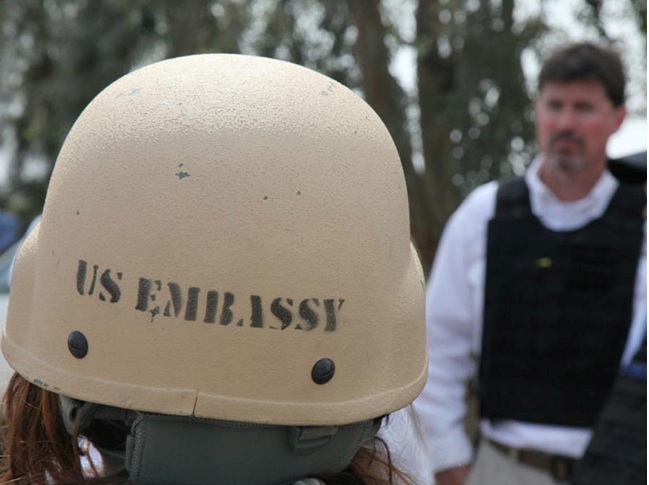
President Barack Obama and Vice President Joe Biden meet with senior military leadership in the Cabinet Room of the White House.<a href="http://www.flickr.com/photos/whitehouse/7180323233/in/photostream/">The White House</a>/Flickr
This story first appeared on the TomDispatch website.
White is black and down is up. Leaks that favor the president are shoveled out regardless of national security, while national security is twisted to pummel leaks that do not favor him. Watching their boss, bureaucrats act on their own, freelancing the punishment of whistleblowers, knowing their retaliatory actions will be condoned. The United States rains Hellfire missiles down on its enemies, with the president alone sitting in judgment of who will live and who will die by his hand.
The issue of whether the White House leaked information to support the president’s reelection while crushing whistleblower leaks it disfavors shouldn’t be seen as just another O’Reilly v. Maddow sporting event. What lies at the nexus of Obama’s targeted drone killings, his self-serving leaks, and his aggressive prosecution of whistleblowers is a president who believes himself above the law, and seems convinced that he alone has a preternatural ability to determine right from wrong.
If the President Does It, It’s Legal?
In May 2011 the Pentagon declared that another country’s cyber-attacks—computer sabotage, against the US—could be considered an “act of war.” Then, one morning in 2012 readers of the New York Times woke up to headlines announcing that the Stuxnet worm had been dispatched into Iran’s nuclear facilities to shut down its computer-controlled centrifuges (essential to nuclear fuel processing) by order of President Obama and executed by the US and Israel. The info had been leaked to the paper by anonymous “high ranking officials.” In other words, the speculation about Stuxnet was at an end. It was an act of war ordered by the president alone.
Similarly, after years of now-you-see-it-now-you-don’t stories about drone attacks across the Greater Middle East launched “presumably” by the US, the Times (again) carried a remarkable story not only confirming the drone killings—a technology that had morphed into a policy—but noting that Obama himself was the Great Bombardier. He had, the newspaper reported, designated himself the final decision-maker on an eyes-only “kill list” of human beings the United States wanted to destroy. It was, in short, the ultimate no-fly list. Clearly, this, too, had previously been classified top-secret material, and yet its disclosure was attributed directly to White House sources.
 Now, everyone is upset about the leaks. It’s already a real Red v. Blue donnybrook in an election year. Senate Democrats blasted the cyberattack-on-Iran leaks and warned that the disclosure of Obama’s order could put the country at risk of a retaliatory strike. Republican Old Man and former presidential candidate Senator John McCain charged Obama with violating national security,z saying the leaks are “an attempt to further the president’s political ambitions for the sake of his re-election at the expense of our national security.” He called for an investigation. The FBI, no doubt thrilled to be caught in the middle of all this, dutifully opened a leak investigation, and senators on both sides of the aisle are planning an inquiry of their own.
Now, everyone is upset about the leaks. It’s already a real Red v. Blue donnybrook in an election year. Senate Democrats blasted the cyberattack-on-Iran leaks and warned that the disclosure of Obama’s order could put the country at risk of a retaliatory strike. Republican Old Man and former presidential candidate Senator John McCain charged Obama with violating national security,z saying the leaks are “an attempt to further the president’s political ambitions for the sake of his re-election at the expense of our national security.” He called for an investigation. The FBI, no doubt thrilled to be caught in the middle of all this, dutifully opened a leak investigation, and senators on both sides of the aisle are planning an inquiry of their own.
The high-level leaks on Stuxnet and the kill list, which have finally created such a fuss, actually follow no less self-serving leaked details from last year’s bin Laden raid in Pakistan. A flurry of White House officials vied with each other then to expose ever more examples of Obama’s commander-in-chief role in the operation, to the point where Seal Team 6 seemed almost irrelevant in the face of the president’s personal actions. There were also “high five” congratulatory leaks over the latest failed underwear bomber from Yemen.
On the Other Side of the Mirror
The Obama administration has been cruelly and unusually punishing in its use of the 1917 Espionage Act to stomp on governmental leakers, truth-tellers, and whistleblowers whose disclosures do not support the president’s political ambitions. As Thomas Drake, himself a victim of Obama’s crusade against whistleblowers, told me, “This makes a mockery of the entire classification system, where political gain is now incentive for leaking and whistleblowing is incentive for prosecution.”
The Obama administration has charged more people (six) under the Espionage Act for the alleged mishandling of classified information than all past presidencies combined. (Prior to Obama, there were only three such cases in American history, one being Daniel Ellsberg, of Nixon-era Pentagon Papers fame.) The most recent Espionage Act case is that of former CIA officer John Kiriakou, charged for allegedly disclosing classified information to journalists about the horrors of waterboarding. Meanwhile, his evil twin, former CIA officer Jose Rodriguez, has a best-selling book out bragging about the success of waterboarding and his own hand in the dirty work.
Obama’s zeal in silencing leaks that don’t make him look like a superhero extends beyond the deployment of the Espionage Act into a complex legal tangle of retaliatory practices, life-destroying threats, on-the-job harassment, and firings. Lots of firings.
Upside Down Is Right Side Up
In ever-more polarized Washington, the story of Obama’s self-serving leaks is quickly devolving into a Democratic/Republican, he-said/she-said contest—and it’s only bound to spiral downward from there until the story is reduced to nothing but partisan bickering over who can get the most advantage from those leaks.
But don’t think that’s all that’s at stake in Washington. In the ever-skittish Federal bureaucracy, among the millions of men and women who actually are the government, the message has been much more specific, and it’s no political football game. Even more frightened and edgy than usual in the post-9/11 era, bureaucrats take their cues from the top. So expect more leaks that empower the Obama Superman myth and more retaliatory, freelance acts of harassment against genuine whistleblowers. After all, it’s all been sanctioned.
Having once been one of those frightened bureaucrats at the State Department, I now must include myself among the victims of the freelancing attacks on whistleblowers. The Department of State is in the process of firing me, seeking to make me the first person to suffer any sanction over the WikiLeaks disclosures. It’s been a backdoor way of retaliating for my book, We Meant Well: How I Helped Lose the Battle for the Hearts and Minds of the Iraqi People, which was an honest account of State’s waste and mismanagement in the “reconstruction” of Iraq.
Unlike Bradley Manning, on trial under the Espionage Act for allegedly dumping a quarter million classified documents onto the Internet, my fireable offense was linking to just one of them at my blog. Just a link, mind you, not a leak. The document, still unconfirmed as authentic by the State Department even as they seek to force me out over it, is on the web and available to anyone with a mouse, from Kabul to Tehran to Des Moines.
That document was discussed in several newspaper articles before—and after—I “disclosed” it with my link. It was a document that admittedly did make the US government look dumb, and that was evidently reason enough for the State Department to suspend my security clearance and seek to fire me, even after the Department of Justice declined to prosecute. Go ahead and click on a link yourself and commit what State now considers a crime.
This is the sort of thing that happens when reality is suspended in Washington, when the drones take flight, the worms turn, and the president decides that he, and he alone, is the man.
What Happens When Everything Is Classified?
What happens when the very definitions that control life in government become so topsy-turvy that 1984 starts looking more like a handbook than a novel?
I lived in Taiwan when that island was still under martial law. Things that everyone could see, like demonstrations, never appeared in the press. It was illegal to photograph public buildings or bridges, even when you could buy postcards nearby of some of the same structures. And that was a way of life, just not one you’d want.
If that strikes you as familiar in America today, it should. When everything is classified—according to the Information Security Oversight Office, in 2011 American officials classified more than 92,000,000 documents—any attempt to report on anything threatens to become a crime; unless, of course, the White House decides to leak to you in return for a soft story about a heroic war president.
For everyone else working to create Jefferson’s informed citizenry, it works very differently, even at the paper that carried the administration’s happy leaks. Times reporter Jim Risen is now the subject of subpoenas by the Obama administration demanding he name his sources as part of the Espionage Act case against former CIA officer Jeffery Sterling. Risen was a journalist doing his job, and he raises this perfectly reasonable, but increasingly outmoded question: “Can you have a democracy without aggressive investigative journalism? I don’t believe you can, and that’s why I’m fighting.” Meanwhile, the government calls him their only witness to a leaker’s crime.
One thing at stake in the case is the requirement that journalists aggressively pursue information important to the public, even when that means heading into classified territory. If almost everything of importance (and much that isn’t) is classified, then journalism as we know it may become… well, illegal.
Sometimes in present-day Washington there’s simply too much irony for comfort: the story that got Risen in trouble was about an earlier CIA attempt to sabotage Iran’s nuclear program, a plot which failed where Stuxnet sort of succeeded.
The End
James Spione, an Academy Award-nominated director who is currently working on a documentary about whistleblowers in the age of Obama, summed things up to me recently this way: “Beneath the partisan grandstanding, I think what is most troubling about this situation is the sense that the law is being selectively applied. On the one hand, we have the Justice Department twisting the Espionage Act into knots in an attempt to crack down on leaks from ‘little guys’ like Thomas Drake and John Kiriakou, while at the same time an extraordinarily detailed window into covert drone policy magically appears in the Times.
“Notwithstanding Mr. McCain’s outrage, I don’t believe this is about security at all. It is the unfair singling out of whistleblowers by a secrecy regime that is more than anything just another weapon in the state’s arsenal to bludgeon its enemies while vaunting its supposed successes—if you can call blowing up unsuspecting people, their families, and friends with a remote control airplane ‘success.'”
Here is the simple reality of our moment: the president has definitively declared himself (and his advisors and those who carry out his orders) above the law, both statutory and moral. It is now for him and him alone to decide who will live and who will die under the drones, for him to reward media outlets with inside information or smack journalists who disturb him and his colleagues with subpoenas, and worst of all, to decide all by himself what is right and what is wrong.
The image Obama holds of himself, and the one his people have been aggressively promoting recently is of a righteous killer, ready to bloody his hands to smite “terrorists” and whistleblowers equally. If that sounds Biblical, it should. If it sounds full of unnerving pride, it should as well. If this is where a nation of laws ends up, you should be afraid.
Peter Van Buren, a 24-year veteran Foreign Service Officer at the State Department, spent a year in Iraq as Team Leader for two State Department Provincial Reconstruction Teams. Now in Washington and a TomDispatch regular, he writes about Iraq, the Middle East, and US diplomacy at his blog, We Meant Well. Since his book, We Meant Well: How I Helped Lose the Battle for the Hearts and Minds of the Iraqi People (The American Empire Project, Metropolitan Books), was published in 2011, the Department of State has begun termination proceedings against him, after reassigning him to a make-work position and stripping him of his security clearance and diplomatic credentials. To listen to Timothy MacBain’s latest Tomcast audio interview in which Van Buren discusses how Washington has changed when it comes to both leaking and stifling information, click here or download it to your iPod here.
[Disclaimer: The views here are solely those of the author, expressed in his capacity as a private citizen.]
Follow TomDispatch on Twitter @TomDispatch, join us on Facebook, and check out the latest TD book, Terminator Planet: The First History of Drone Warfare, 2001-2050. To stay on top of important articles like these, sign up to receive the latest updates from TomDispatch.com here.
















